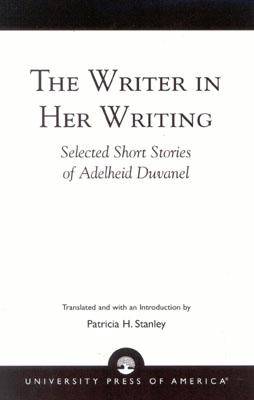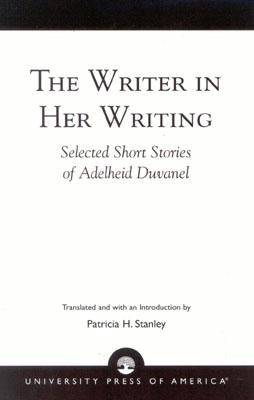
Door een staking bij bpost kan je online bestelling op dit moment iets langer onderweg zijn dan voorzien. Dringend iets nodig? Onze winkels ontvangen jou met open armen!
- Afhalen na 1 uur in een winkel met voorraad
- Gratis thuislevering in België vanaf € 30
- Ruim aanbod met 7 miljoen producten
Door een staking bij bpost kan je online bestelling op dit moment iets langer onderweg zijn dan voorzien. Dringend iets nodig? Onze winkels ontvangen jou met open armen!
- Afhalen na 1 uur in een winkel met voorraad
- Gratis thuislevering in België vanaf € 30
- Ruim aanbod met 7 miljoen producten
Zoeken
The Writer in Her Writing
Selected Short Stories of Adelheid Duvanel
Adelheid Duvanel
Paperback | Engels
€ 68,45
+ 136 punten
Omschrijving
This collection of stories translated from the original German of the Swiss writer Adelheid Duvanel (1936-1996) is preceded by an introductory biographical essay that should help the reader to understand the connections between Duvanel's life and her subjects. The apparent lack of love in the lives of all her subjects can be traced back to Duvanel's extremely complex and chaotic life. The subjects of Duvanel's stories, which were mostly women or children, included single mothers without financial or emotional support from the biological father; elderly, lonely women; illegitimate children; men and women afraid of relationships. These short stories deal with one situation, presented with (sometimes surreal) imagery that seems to reside in the unconscious: yet an undercurrent of wry Neo-Expressionism. Instead of dialogue we read the thoughts and dreams of a subject, thanks to imagery reminiscent of the art of Max Ernst. In fact, several stories are nothing but the retelling of a dream.
Specificaties
Betrokkenen
- Auteur(s):
- Uitgeverij:
Inhoud
- Aantal bladzijden:
- 128
- Taal:
- Engels
Eigenschappen
- Productcode (EAN):
- 9780761823377
- Verschijningsdatum:
- 2/07/2002
- Uitvoering:
- Paperback
- Formaat:
- Trade paperback (VS)
- Afmetingen:
- 146 mm x 213 mm
- Gewicht:
- 254 g

Alleen bij Standaard Boekhandel
+ 136 punten op je klantenkaart van Standaard Boekhandel
Beoordelingen
We publiceren alleen reviews die voldoen aan de voorwaarden voor reviews. Bekijk onze voorwaarden voor reviews.











